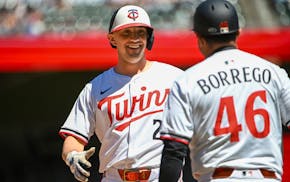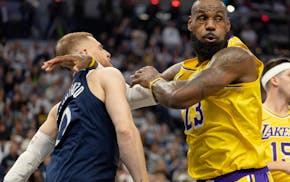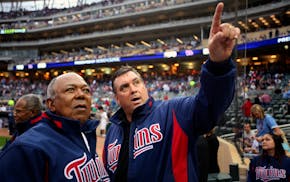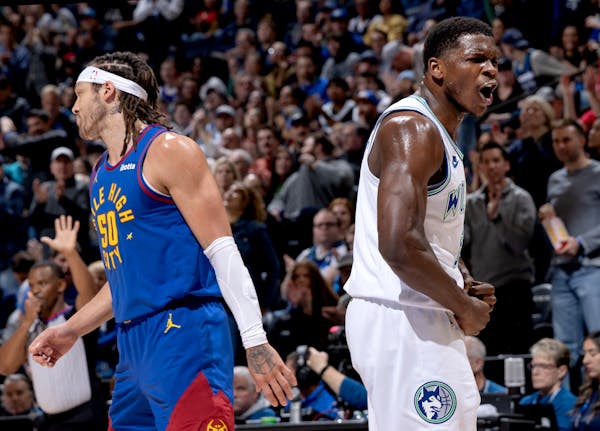The NBA expanded to 23 teams with the addition of the Dallas Mavericks for the 1980-81 season and there were indications that decade the league wanted more.
Marv Wolfenson had felt the void when the Minneapolis Lakers left here in 1960, and he convinced business partner Harvey Ratner to pursue a team.
Marv and Harv made an appointment with Don Fraser, the Minneapolis mayor, with this happy news.
"The mayor's comment after a 45-minute meeting was, 'Good luck in bringing back the NBA to Minneapolis, but there's nothing we can do to help you,' " said Bob Stein on Thursday, with a small laugh.
On April 22, 1987, the NBA announced four expansion sites: Charlotte and Miami for the 1988-89 season, Orlando and Minnesota for 1989-90 — each paying the kingly sum of $32.5 million to become part of the league. Stein — Gophers great, now a College Football Hall of Famer — was Wolfenson's son-in-law and would run the NBA expansion team in its early years.
Seven years later, with games being lost, coaches being fired and the business of the franchise being sunk by Marv and Harv's debt on their $73 million mortgage for the privately funded Target Center, a phone call was needed. The NBA had just rejected a proposed sale to New Orleans, keeping the Wolves in Minneapolis for at least another season, and a local group headed by Bill Sexton had been unable to seal a deal to buy the team.
Arne Carlson, Minnesota's Republican governor, dialed up Mankato businessman Glen Taylor in July 1994, long before anyone was placing the now-compulsory "billionaire" in front of Taylor's name.
"I got the call from Governor Carlson and, of course, because I had been the minority leader in the State Senate as a Republican, we knew each other well," Taylor said.
"He called me and said, 'Glen, we have a group of people that wants to buy the Timberwolves, they're dealing with Marv and Harv and the deal isn't getting done; you're a business guy and have been in politics … maybe you could help them get it done.'"
Taylor drove to Minneapolis, where he had to start off by introducing himself to Wolfenson, Ratner and Sexton.
"I tried to set up a deal — as a mediator,'' Taylor said. "You sit one group in a room, the other group in another room, and talk to them separately: 'What do you want? What have you negotiated so far?'
"You try to find the common ground. You go up there and pretty soon, Sexton's not in the room, Marv and Harv are not in the room, it's just lawyers and accountants. The actual buyers and owners were not involved as much as they should have been.
"I stayed there for a week and said, 'I'm going home.' I knew it wasn't getting done."
Taylor was back in Mankato for two-plus weeks, and then there was a report in the Star Tribune (which, yes, Taylor now owns) confirming there would be no deal for Sexton.
"That Monday," Taylor said, "I got a call from Marv, and he said, 'Glen, we've been trying to sell this thing for three years and you're the first guy that really laid out a program. You understand all of it, including the politics with the city now wanting the building. So, why don't you buy the team?' "
Taylor's response was that he would be there the next day, adding: "Don't tell anybody you talked to me'' — the "anybody" being Star Tribune columnist Sid Hartman, Wolfenson's lifelong friend.
"I came to Minneapolis and we talked Tuesday, Wednesday, Thursday and then Friday at 2 o'clock in the morning, I called those guys and told them to be at the lawyers' office that morning. I wrote out what I was going to say and what I was going to offer on a yellow sheet of paper.
"There was a big conference table. I have my five or six people. They have all of their lawyers, accountants … and Marv and Harv.
"I'm all business, as always, and said, 'We're going to offer $88 million for the team. Marv and Harv keep 10 percent ownership, and their seats. Bob Stein can stay and my son-in-law Rob Moor will come in and they will run the club.'
"One thing Sexton didn't understand about was 'keeping your seats.' That's an important thing for people.
"I finished and said, 'That's the deal.' "
"A couple of lawyers said, 'Where's the contract?' I said, 'That's it.'
"I look over there and Marv's writing on the back of a No. 10 envelope. I have an 8½ by 11 sheet of yellow paper and he has a No. 10 envelope.
"Marv was sitting on the other side from me. He walked the whole length of the table. He came around, I stood up and I put out my hand, we shook and he said, 'It's a deal.' "
Taylor was telling the tale of the purchase in an afternoon visit to his house in Naples. Fla. in mid-February. Glen and wife Becky were there for a couple of weeks, returned home to Mankato, and then came the maelstrom of March 28, when Taylor claimed Marc Lore and Alex Rodriguez had not made a deadline and the Timberwolves were no longer for sale.
Arbitration will decide in 2024, not handshakes.
The simple times of 30 years past were further demonstrated in the hours after Taylor reached that deal with Wolfenson.
"Bob Stein was there and he gave me a number for the NBA office,'' Taylor said. "I went back to my hotel room and called. It was a general number and a lady answered, 'NBA.'
"I said, 'My name is Glen Taylor, you don't know me, but I'd appreciate if you listen to me. I just bought the Minnesota Timberwolves.'
"She sort of laughed and said, 'We hear this stuff.' I said, 'I understand, but I'd like you to take this message to whomever you choose, and tell them to call anyone they deal with in Minnesota, and they will know me.
"She said, 'Just a minute, there is someone I can transfer you to.' And that person comes on the line and said, 'I understand you said you bought the Timberwolves. I don't know who you are, but my name is Adam Silver.''
Silver, now the NBA commissioner, was a deputy to David Stern. And four hours later, maybe a touch more, Silver was landing on the NBA plane in the Twin Cities to meet the new owner of Minnesota's NBA team.
And Marv, the return-of-the-NBA dreamer for Minneapolis, and partner Harv still had their seats for the start of the Kevin Garnett Era.

Reusse: The Twins, leaking fans and competing with NBA and NHL playoffs, needed that prospect

Reusse: Timberwolves-Lakers theme develops as NBA takes a day off from taking Edwards' money


